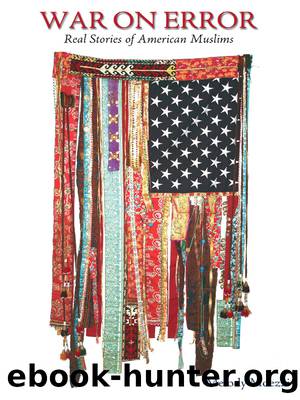War on Error by Moezzi Melody;Ahmed An-Na'im Abdullahi;MELODY MOEZZI;Moezzi Melody;

Author:Moezzi, Melody;Ahmed An-Na'im, Abdullahi;MELODY, MOEZZI;Moezzi, Melody; [Moezzi, Melody]
Language: eng
Format: epub
Publisher: University of Arkansas Press
When I ask Sanida why she considers herself American as well as Bosnian, she says that, despite being more jaded today about the possibilities this country represents, she still believes that if she works hard enough she can make something of herself and that she will not be held back in life because of her race, religion, or ethnicity. âWhen I go back to Bosnia,â she explains, âI get irritated by the prejudices I see even within my own community, a kind of prejudice that I remember but that never used to bother me until I came here. America has turned me into a much more open-minded and tolerant person. I have learned to accept homosexuals and people of different races, and I know that this part of me that accepts those who are presumably so different than me is very American.â
She cannot forget that in Bosnia, there were people trying to kill her because she was Muslim, people who tried to say that she and her people didn't exist, that they were all just failures of Tito's Yugoslavian experiment who were really just Serbian or Croatian. Sanida didn't find out that she was Muslim until the war began. In her house, there were copies of the Qur'an, the Talmud, and the Bible. âWe were international,â she explains. âI didn't believe in God until I was fourteen, when they attacked us. Before that, Tito was the closest thing I knew to God.â
While she may not have fully understood what it meant to be Muslim while she was growing up, her family still celebrated Muslim holidays, and her parents both knew and recited many surahs from the Qur'an by heart. Indeed, she grew up in a Muslim household and engaged in distinctly âMuslimâ activities; she simply failed to make the association between religion and faith until the beginning of the war. Her best friend, Gabriella, was Croatian, and up until the war broke out, Sanida never fully understood why her family, unlike Gabriella's, never put up a Christmas tree until after Christmas, or why when she knocked on doors for eggs at Easter, her Muslim neighbors laughed, while telling her that they had no eggs. Later, she would learn that Christmas and Easter are Christian holidays; she would learn that her family only put up a Christmas tree to celebrate the new year; she would learn that Muslims don't celebrate Easter; she would learn to tell the difference between Christian and Muslim names; and she would learn that these differences mattered immeasurably to many of those around her.
Gabriella stayed in Bosnia, graduated from high school, and recently married. Sanida explains that Gabriella came from a good, honest Catholic family and that they suffered a lot. Gabriella's dad was taken prisoner during the war by Bosnians who insisted that he was a spy, despite the fact that he was an ailing sixty-year-old man who couldn't even read.
Sanida has since lost contact with Gabriella. âI think my life here would shock her,â Sanida explains.
Download
This site does not store any files on its server. We only index and link to content provided by other sites. Please contact the content providers to delete copyright contents if any and email us, we'll remove relevant links or contents immediately.
Getting It, Then Getting Along by L. Reynolds Andiric(610)
Global Justice, Christology and Christian Ethics by Lisa Sowle Cahill(386)
Religion and Politics Beyond the Culture Wars : New Directions in a Divided America by Darren Dochuk(385)
Positive Psychology in Christian Perspective: Foundations, Concepts, and Applications by Charles Hackney(323)
Forgiveness and Christian Ethics by Unknown(308)
Douglas Hamp The First Six Days by Unknown(210)
Christian Martyrdom and Christian Violence by Matthew D. Lundberg;(201)
The Oxford Handbook of Greek and Roman Mythography by R. Scott Smith;Stephen M. Trzaskoma;(194)
Beyond Heaven and Earth by Gabriel Levy(188)
The Bloomsbury Reader in Christian-Muslim Relations, 600-1500 by David Thomas;(186)
God and Eros by Patterson Colin;Sweeney Conor;(185)
Insurgency, Counter-insurgency and Policing in Centre-West Mexico, 1926-1929 by Mark Lawrence(184)
The Horrors and Absurdities of Religion by Arthur Schopenhauer(178)
Autobiography, Volume 2: 1937-1960, Exile's Odyssey by Mircea Eliade(171)
Cult Trip by Anke Richter(171)
Witches: the history of a persecution by Nigel Cawthorne(169)
The Myth of Disenchantment by Jason A. Josephson-Storm(156)
An Introduction to Kierkegaard by Peter Vardy(154)
The Believer by Sarah Krasnostein(150)
